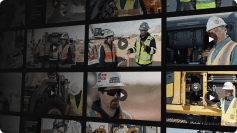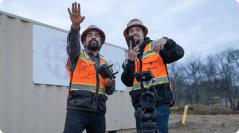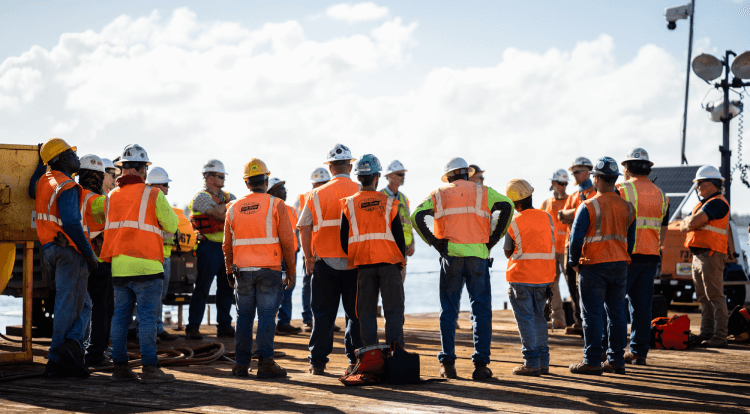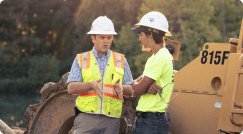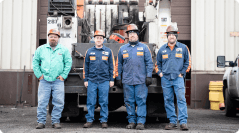Why Build a Career in the Dirt World?
Written by Megan Hamilton
March 1, 2023
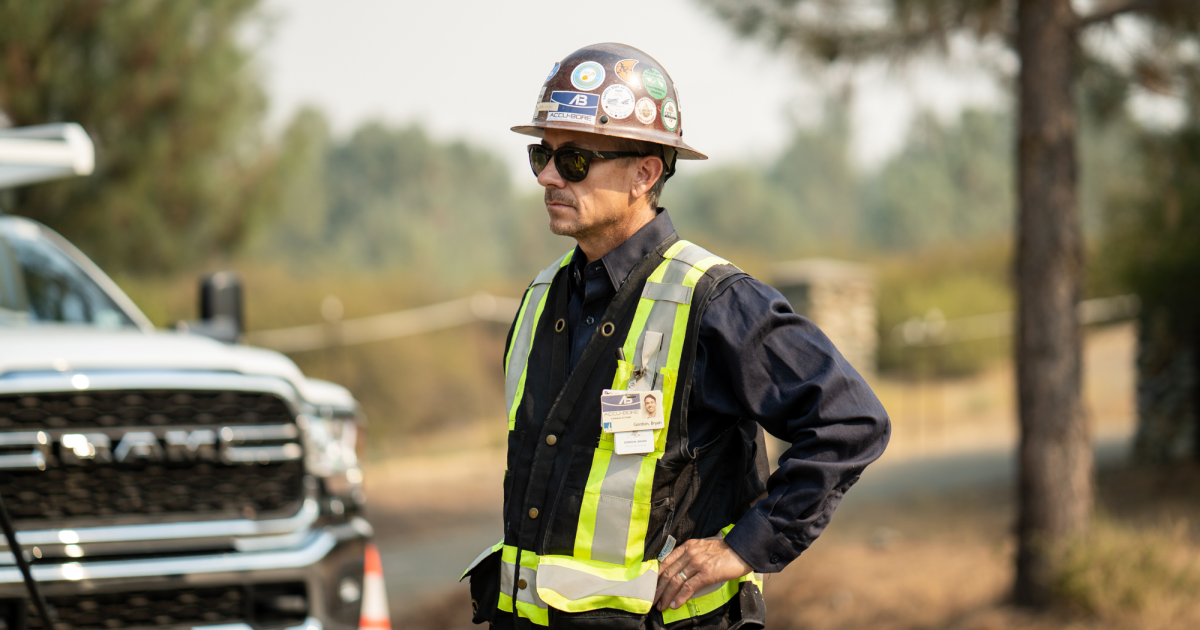
The Dirt World is all around us, making the essentials society needs to survive. So if you’re looking for a meaningful career, look no further!
Over 8 million people work in this industry, and we wanted to know what attracted them to it.1,2 So we asked three people with over 50 years of combined industry experience.
We’ll introduce you to them. Then, we’ll walk you through nine reasons people work in the Dirt World.
Meet Eric, Jason, and Randy
Now, let’s dig into why you should consider a career in the Dirt World.
01Good pay
Your career should do more than just pay the bills. You should be able to give to others, save for the future, and afford fun extras for your family.
Not all Dirt World jobs pay top dollar, but most pay better than a “normal” job. The average American worker makes $33 an hour.3 The average construction worker earns $35-36, and mine workers typically earn $37-38.4,5
Workers can also increase their pay by learning new skills or taking on new roles. In the Dirt World, how much money you make is primarily up to you.
02Meaningful work
People often think the Dirt World is labor-intensive, dirty, and dangerous. They buy into those myths about the industry, but you know what? You could say the same about firefighting, yet firefighting is considered a noble profession
So is the Dirt World.
Dirt workers don’t “just” move dirt or “just” pave roads. They mine and make what society needs to survive.
In white-collar jobs, people call a pointless status report “urgent.” But Dirt work has purpose, and it matters whether it gets done. It’s meaningful work that makes a difference.
“People in this industry care about their work. They understand what they need to do their job, and they understand what they need to do to help society and themselves go forward.” - Eric
And Dirt World workers get to give back to others by donating time, equipment, or money to support charitable causes.
03“The people in this industry are humble to a fault. I felt good to be in this industry, because we were giving back to communities in areas that needed it.” - Jason
Job security
Dirt World work will always be in demand—and if you learn these skills, so will you. You may change jobs or companies, but you’ll have a career for life in this industry.
“I like being a dozer operator. It sounds like a really popular job, but it’s not. It’s something most people can’t do. It takes a special kind of person to understand how a piece of equipment works.” - Eric
Unemployment in the Dirt World
“Given ’08, COVID, and economic challenges, remember that we build every year. Construction is an ongoing, stable industry.” - Jason
The unemployment rate for extraction workers was 0.3% in January 2023.6 That’s 11 times lower than the national average!7 Construction unemployment averaged 5-6% from 2021 to 2022—close to the national rate of 4-5%.8,9
Seasonal trends impact employment. For example, some construction companies cut crew sizes in the winter, while others work year-round. But you can work with that. Maybe you enjoy the time off, take a seasonal job to tide you over, or move someplace where the weather impacts construction less.
04Camaraderie
In the Dirt World, you’ll almost always work with a small group of people called a crew. Most crews have strong bonds—partly because doing physical labor together builds camaraderie.10
“When you work on a crew that has camaraderie and you’re getting stuff done, there’s an exponential amount of joy and satisfaction that comes from that.” - Randy
In the Dirt World, you're far less likely to encounter a cutthroat, climb-over-others mentality than you are in some other jobs. You truly have to work as a team to get Dirt jobs done. So you'll typically have a much nicer working experience because there's an attitude that, "We're all in this together."
Dirt World workers also develop strong bonds because they keep each other safe. Every jobsite has inherent risks, and it takes everyone to spot and prevent safety issues.
05“There’s always gonna be a sense of, ‘This guy in the machine above me could kill me if he does the wrong thing,’ but I have full faith that he knows what he’s doing.” - Eric
A lifelong career at any education level
“Young kids are just sent to college with no thought about any other possibilities. I didn’t go to college, and I feel like I’m doing okay.” - Eric
Many young people and parents believe you need a college degree to succeed in life. But that’s simply not true.
The truth is you need education. But college does not equal education. Education comes from increasing your knowledge. That can mean college, or it can mean training and certification, communication courses, and books.
“Clearly, there are skills you gain from college, so I value it. But I would say I gained a lot more of the skills that made me successful from outside of college.” - Randy
Sometimes it’s smarter to save your money, skip the degree, and start a Dirt career that lets you earn while you learn. Other Dirt careers benefit from (or require) a degree—like engineering, project management, finance, marketing, and business.
That’s another great thing about the Dirt World. You can use your gifts, talents, and knowledge in ways that work for you—not necessarily the way society tells you to.
06“I fell in love with school because I could take everything I was learning and apply it. As part of my education, I wrote a marketing strategy for the company I was working at.” - Jason
Unlimited growth opportunities
The Dirt World is one of the only industries where you can start with a shovel in your hand and become a business owner.
And newcomers have plenty of job opportunities. The construction industry had 400,000 job openings in 2022, and 40% of the workforce is set to retire by 2031.11,12
While it takes around a decade to become highly skilled in most roles, you can still learn and grow your career quickly by joining trade associations and finding mentors on the jobsite.13
“I’ve always worked really hard to do my day job so I have the freedom to get on jobsites and meet new people, see new things. That made me a more well-rounded person.” - Jason
Growth can be horizontal, not just vertical
Don’t get us wrong, promotions are great. But there’s value in being the best backhoe operator. Or knowing how to run five pieces of equipment. Or being a great communicator, crewmate, and mentor.
Approach this industry with an attitude that says, “I’m here to learn and work hard,” and the Dirt World will be your oyster.
“[When I started], I knew nothing. I was so excited to be out there with the team that anything they would ask me to do—whether it was go get coffee, clean the truck, clean up windrow piles, learn how to use the shovel—I’d do it.” - Jason
Randy’s example
Randy’s dad founded Blount Contracting, a successful business that did $4 million in annual revenue. Randy recalls,
“People don’t know my dad didn’t finish high school. He struggled to read. The state let someone read his tests for him because they saw that as a disability. So I went and took the contractor’s license test with him.”
At 17, Randy began working in the family business. Then his dad became ill. Randy took over operations when he was only in his early 20s. He eventually became president of the company and grew it to $40 million.
Randy says,
“So when you talk about opportunities to grow . . . my father was a high school dropout who struggled to read, yet he built a successful business. I was made Vice President when I was 22 because of the circumstances. I made tons of mistakes, but the fact that that could even be an opportunity [is incredible].”
The moral of the story: opportunity is there for those who are willing to learn and work hard.
07Interesting work
If the Dirt World had a motto, it would be, “It’s not boring.”
Most workers move from one project to the next within a short timespan. They typically work outside—although some jobs let you split time between the field and office.
And if your role involves travel, you’ll get to work in beautiful, rugged places across the country. You could be in the Rocky Mountains one week and on the Texas plains the next.
“Shortly after college, I caught up with a friend, and he talked about how boring his job was. I hadn’t had a boring day ever in my career.” - Randy
You also get to make things with your hands, so you can physically see and touch the work you did. That’s incredibly satisfying. You can point at something and say, “I helped do that.” Not all industries give you something tangible to show for your efforts.
The work itself is less grueling than you might think, too.
08“Technology and equipment advances have changed the game. You’re still going to work hard, but the nature of the work is way different than you think.” - Eric
Work-life balance
The Dirt World has struggled to offer good work-life balance. It often requires early mornings, nights, weekends, or travel. However, employers are working hard to change this.
Most construction workers work 39 hours a week—two hours less than the average American.14,15 Miners tend to work more, around 45-47 hours.16 (On the bright side, longer hours offer more earning potential.) Some companies are even trying flexible work schedules with great success.17
09“It was difficult back in the day not knowing what time you were getting off work or if you were working the weekends. But businesses are working harder now than ever to start and finish on more dedicated hours.” - Jason
Family legacy
Eric and Randy are both third-generation Dirt guys. Their dads and grandpas worked in the industry, and they started their own careers as teens. Jason is a fourth generation roadbuilder. His great-grandpa helped pave the Indy 500 track, and at one year old, Jason was sitting in his dad’s lap in a bulldozer.
“My dad was so proud of the work he did. He always talked about how amazing it was, how rewarding it was, the things they built, and the impact they had on communities.” - Jason
Now you might be thinking, No one in my family has worked construction. I don’t have a family legacy in the industry.
But you can start the family legacy. You can do good, noble work. You can come home and tell your kids, “Today I made something that will help people.”
They’ll see that your work makes a difference. And when they’re looking for a career, they’re much more likely to look to the Dirt World because of you.
“All kids want is to know their mom and dad are proud of them. They want to know that when they say ‘I’m a laborer,’ it won’t be frowned upon. It starts with us. We’ve got to be proud of what we do and tell that to our families and friends.” - Jason
Takeaways
Building a career in the Dirt World is a great choice because it gives you
- Good pay
- Meaningful work
- Job security
- Camaraderie
- A lifelong career at any education level
- Unlimited growth opportunities
- Interesting work
- Improving work-life balance
- Family legacy
If that sounds like what you’re looking for, take one last piece of advice from Eric:
“Just go try it. Life is short. If you have any reservations about taking the office job or four years of college, you can spend a month or two at an earthmoving company to get the picture. You may find that you like it.” - Eric
Ready to start looking for your dream career in Dirt? Create your free BuildWitt Jobs profile today. You'll be able to browse current job openings, and when you upload your resume, employers can find you. So you're not the only one doing the work!


